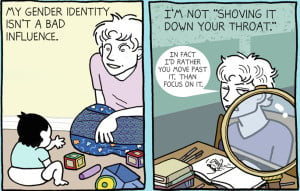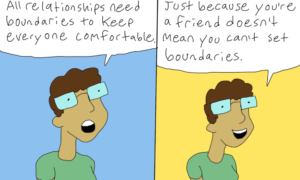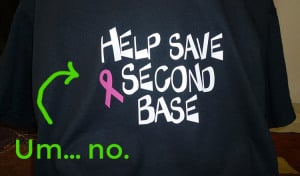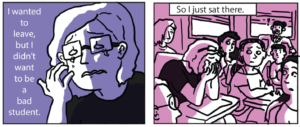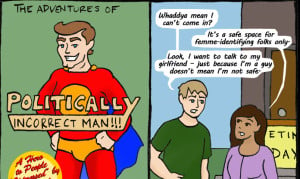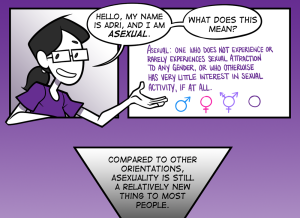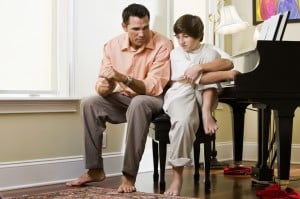Dahlia: To call myself an atheist, I feel like that’s too extreme. I—it’s kind of hard to say because I’m only sixteen, like.
(Title Card: Degrassi group chat. What do you believe?)
Adamo: Are there specific, like, spiritual or faith, or religious traditions that come from, like, your own backgrounds? Like, essentially, how were you raised? Because I was raised Roman Catholic.
Duncan: Yeah, I don’t know. I wasn’t really raised, um, with a faith, just in my own life. But it is in my family.
Bryant: My dad has a couple, uh, gods. I don’t know what. I think they’re from Buddhist, um, tradition, but I honestly don’t know. My dad just keeps them up there for good luck when he buys his lottery tickets.
Dahlia: Growing up, my parents weren’t religious. Well, recently my mom became a Christian, like a couple of years ago. But still, it doesn’t really affect me to be honest.
Adamo: What influenced her choice to be a Christian?
Dahlia: She has MS, which might’ve been a little scary for her. So I think she started going to church and then, like, it just influenced her a lot, and she became a Christian.
Callum: My dad was—is, you know, Christian but really no, we never went to church or did any Christian things. So I was, like, really shocked the first time I ever went to a church, and I thought it was, like, really, really strange.
But spirituality has always been kind of a part of how I was raised? You know the belief that there are, you know, maybe other influences in the world rather than what we can see and feel.
Adamo: Out of curiosity, what do you all believe?
Callum: I think I would say that I am agnostic. I don’t really believe, you know, any religion, per se. But I also think it’s kind of naïve not to believe, like, that there isn’t, you know, anything? It’s very possible that there is something else that we haven’t found or detected that affects the world, but yeah, I don’t know.
Vincent: I was in a Christian school. I was in Hong Kong. God can give you everything. But how about if I do something wrong? God can also take away everything. That’s why I’m kind of afraid of God.
Adamo: It doesn’t sound like a good life if you’re always afraid of making a mistake. It sounds like a stressful life.
Dahlia: I don’t believe in God, but, I don’t know, to call myself an atheist, I feel like that’s too extreme. It’s kind of hard to say because I’m only sixteen. It’s really hard to just decide. “Oh, well, I don’t think there’s something, this God out there,” so I’m just going to pick, “I don’t believe.” But what if there’s other factors? Yeah, it’s complicated.
Adamo: Well, it sounds like you’re staying open.
Dahlia: Yeah.
Adamo: That’s a good thing.
Duncan: Spirituality, for me, feels like a very personal thing. Somebody I think once said, “I feel, um, very spiritual in an empty church and not spiritual in a full one.”
Bryant: I, I, build my own religion. That’s how I describe it. Um, it pulls on everything that I like about all the religions. Don’t be mean to people. Don’t kill people. I do like to believe that there is something out there for me after I’m gone.
That’s what I believe in, and I really hope that I’m not wrong. Because if I’m wrong, then I’ll just be stuck in an eternity of nothing as the universal goes on until its eventual death.
Adamo: And we’ll never know. We’ll never know, it’s the whole point of faith. I have such a beautiful life, and I’ve been so blessed up to this point, that if I’m expecting another one, I find this to be very self-indulgent and very greedy. I don’t think I’m owed a second one. What about religion and spirituality? Are they different?
Duncan: Spirituality is a very really loose term, I feel. It can really apply to anything that we can’t exactly explain or feel or see. But religion, I think, tries to make spirituality a shared experience.
Callum: It’s kind of like putting spirituality in a box and saying, “Okay, these are the things you have to do to be spiritual?”
Adamo: But do you think organized religion helps people?
Duncan: I think it can, I really do. And I think for a lot of people, that they maybe need that structure or it’s helpful, and, I think, one of the really great things about organized religion is that it really does create, like, a sense of community for a lot of people.
Adamo: How do you make sense of religion when it excludes somebody from your community? ‘Cause it could be used, you’re right, in a positive way where we build a sense of community. Like, is it okay if a religion is just like, “You do you, I just don’t fit there?” Or should I ask the Catholic Church to change?
Duncan: Like, it’s not anybody’s responsibility to change to fit a religion if it’s not, like, right for them. But, then, I feel like if you’re going to live by that, then you shouldn’t maybe expect the religion to change for you either.
Callum: The church is modernizing.
Duncan: It is.
Callum: It’s different. You know, churches are now becoming accepting of, you know, gay people and kind of realizing that a lot of those sort of beliefs are now kind of outdated. And you can still actually believe a lot of the sort of fundamental pieces of Christianity without saying, you know, “You can’t be gay” or something like that.
Like there are ways that religion can modernize, and, yeah, I think it should.
Duncan: I mean, I think if religion wants to stay relevant, then it has to modernize. You can’t just stay the same because the rest of the world isn’t going to. And I feel like that is a big reason that people in, like, recent years have moved away from religion a lot. Like, it used to be much more prevalent in society.
Callum: But in some ways, it almost seems like religion almost has to be afraid of change because, like, as we become more scientifically advanced, and we start kind of realizing a lot of things we used to think are true now can be explained in another way. You kind of have religion going, “Okay, wait a second. Like, this isn’t really relevant.”
Adamo: When you guys write papers right now. How updated is your bibliography have to be?
Callum: Well, we’re not citing 2,000 year-old books.
Adamo: Exactly. Your teacher would be like, “I’m sorry, this book was written 2,000 years ago? I probably don’t think it’s up-to-date and accurate.”
Bryant: Well, some of our teachers feel that way about our textbooks currently.
Duncan: If you’re afraid that science is, you know, disproving your faith, you don’t really have very much faith.
Adamo: We had a great chat about religion and spirituality, I just feel like it’s one of the hard things to talk about. Why? Why’s it so hard? Why are we so awkward about it?
Duncan: Probably because we don’t want to offend each other. It’s really a taboo subject, a lot, in this day and age, like, it’s kind of scary.
Callum: I think it’s also kind of scary because of how personal it is. It’s really different from individual to individual.
Bryant: I think maybe it’s because we’re scared of what the answer will be. If they’re as vehement in their beliefs are you are in yours, then you’re just at a deadlock, and then what happens? Is anyone right?
Are you both going to damnation or whatever celestial incarnate of, like, whatever suckiest thing ever is for either of us?
Adamo: (laughing and repeating Bryant) The suckiest thing ever.
Bryant: (continues) Like is that’s what’s going to happen to both of you because you don’t subscribe to each other’s beliefs?
Adamo: “The truth,” whatever it is, is going to be scary I guess.
Bryant: I think the truth is really what happens when you see the light at the end of the tunnel. That’s when you’ll find out the truth.
Adamo: That was awesome guys. Thanks for chatting. Thanks for inviting us to your school.





